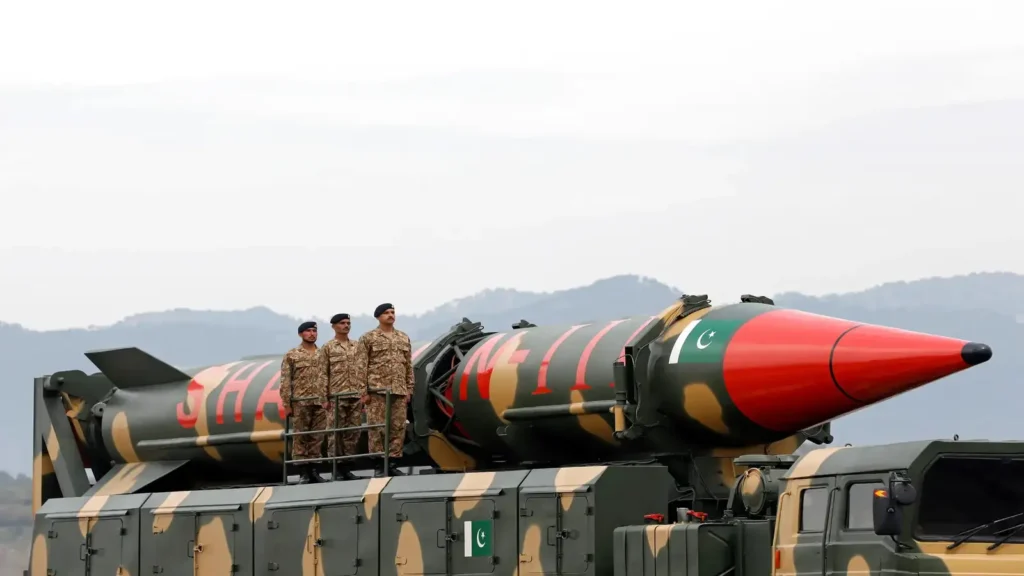ISLAMABAD, Pakistan — Pakistan launched a surface-to-surface ballistic missile Saturday as tensions with neighboring India soared following a brutal gun attack in Kashmir that left 26 Indian tourists dead last month. The missile test, seen as a pointed strategic gesture, comes amid heightened military posturing on both sides and a diplomatic breakdown that has further inflamed one of South Asia’s most volatile conflicts.

The Pakistani military announced the successful test of the Abdali Weapon System, a short-range ballistic missile capable of striking targets up to 450 kilometers (approximately 280 miles) away. In a statement, the military emphasized the test was aimed at assessing the missile’s “operational readiness” and validating its advanced navigation system and improved maneuverability. The launch, which was not directed toward the Indian border, reportedly took place in either the Arabian Sea or the desert expanses of southwestern Balochistan—typical sites for such exercises.
Pakistan’s Prime Minister Shehbaz Sharif and President Asif Ali Zardari issued statements congratulating the defense establishment on the successful test. However, analysts and observers suggest the launch was timed not only for military preparedness but also to send a clear political signal to India amid rising hostility.
Islamabad-based security analyst Syed Muhammad Ali underscored the symbolic value of the missile’s name—Abdali—after a historic Muslim conqueror of India. “The timing of this launch is critical in the current geopolitical context,” Ali said. “It was clearly meant to serve as a deterrent and a response to the rhetoric and actions from New Delhi following the Pahalgam massacre.”
India has squarely blamed Pakistan for orchestrating the April 22 attack in the scenic town of Pahalgam in Indian-administered Kashmir, where gunmen opened fire on tourists, killing individuals from 13 different Indian states. Pakistan has vehemently denied any involvement in the killings.
The fallout from the massacre has triggered a diplomatic crisis between the nuclear-armed rivals. India has suspended all mail exchanges via air and land routes, banned the import of goods from Pakistan, and blocked access to its ports for Pakistani-flagged vessels. Indian vessels are similarly barred from docking in Pakistan.
In response to what it called “unprovoked firing,” the Indian military said Pakistani troops have opened fire across the Line of Control—the heavily militarized de facto border dividing Kashmir—for nine consecutive nights. India claimed its forces “responded promptly and proportionately.” Pakistan has not confirmed the reports, and independent verification remains difficult as both sides frequently trade accusations of initiating cross-border skirmishes.
The border tensions were further inflamed as large crowds gathered on the Pakistani side of the Wagah border on Saturday for the ritual flag-lowering ceremony—a dramatic display of nationalism and military precision performed daily by both nations’ forces. Among the spectators was Shoaib-ur-Rehman, who described the experience as deeply moving. “No other experience stirs such patriotism in me,” he said. While voicing opposition to war, he added, “I would stand with our army if one broke out.”
Sundas Batool, another attendee, dismissed India’s accusations, demanding concrete evidence linking Pakistan to the Pahalgam massacre. “The other side must have seen our energy, our spirit,” she said. “My message to India is: We are ready for anything.”
Meanwhile, India’s navy recently announced it had conducted anti-ship missile tests to validate its long-range strike capabilities, a move seen as further demonstration of military preparedness in light of the regional tensions.
Ashok Malik, a former policy advisor to India’s foreign ministry, said the country is simmering with anger over the attack. “There is enormous sympathy for India internationally, and very little patience left for Pakistan,” he said. “Nobody wants a full-fledged war, but there is growing domestic pressure for a sharp and limited response.”
Kashmir, a mountainous region claimed in full by both India and Pakistan but controlled in parts by each, has long been a flashpoint for conflict. The two countries have fought three wars since independence from British rule in 1947—two of them over Kashmir. The region remains one of the most dangerous nuclear flashpoints in the world, and with diplomatic ties severed and cross-border hostilities escalating, the risk of miscalculation is ever-present.


